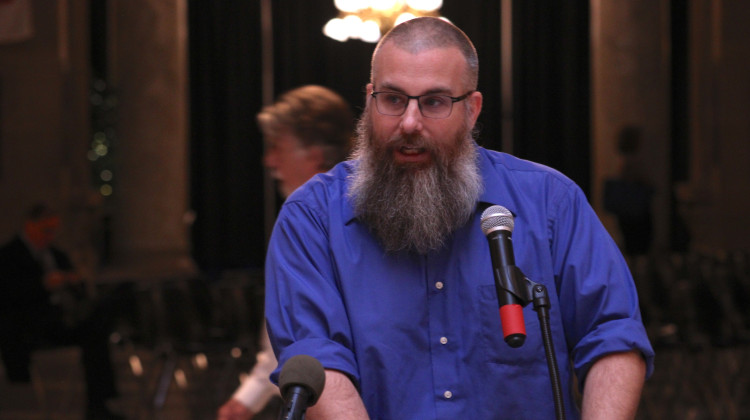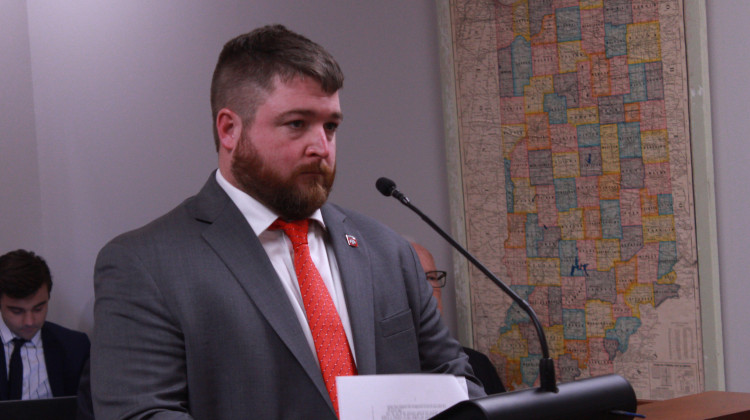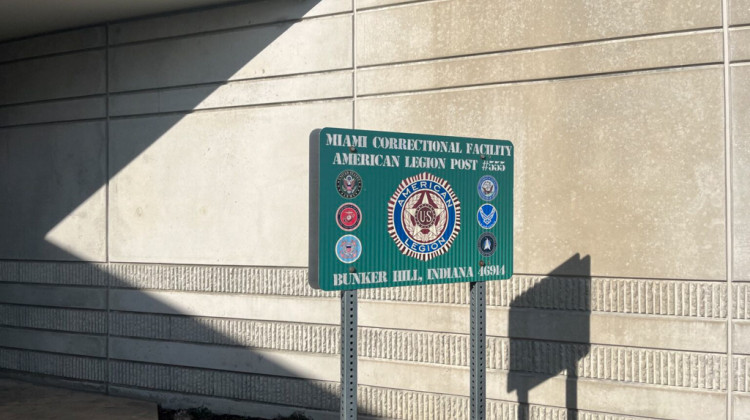
Bob Rice of Hamilton Southeastern Schools said the district has saved hundreds of thousands of taxpayer dollars by installing solar panels at three of its schools.
Ben Thorp/WBAASolar advocates said the Indiana legislature is helping utilities eliminate their competition by making independent solar less affordable. That was the message at this year’s Renewable Energy Day at the Statehouse.
Minutes before the event, Democratic state representatives tried again and failed to pass amendments that would have made solar more affordable for Hoosiers.
One would have created a community solar program — allowing residents to invest in a solar project as a group. The other attempted to overturn a recent Indiana Supreme Court decision that said CenterPoint Energy could use a different way to calculate solar customer’s bills, lowering the credits they receive.
While the growth of rooftop solar has been slow in Indiana, utility-scale solar farms doubled the state’s total solar capacity from 2020 to 2021. Rep. Matt Pierce (D-Bloomington) said utilities don’t mind renewables if they can get a return on them.
“They're much less excited about us making our own investments and becoming more energy independent," he said.
Join the conversation and sign up for the Indiana Two-Way. Text "Indiana" to 73224. Your comments and questions in response to our weekly text help us find the answers you need on statewide issues, including this series on climate change and solutions.
Bob Rice is the energy manager at Hamilton Southeastern Schools in Fishers. He said the district used less electricity last year than the previous year, but is paying more for that energy because of higher utility rates.
In 2019, the district installed solar panels at three of its schools. Rice said estimated the district saved $310,000 in energy costs at those schools.
"Taxpayer money that is going into classrooms, being repurposed to educate our students and not going to utility companies to buy power," he said.
Solar advocates said favoring utility-scale solar also keeps smaller Indiana solar businesses from growing.
Patrick Regan is the president of Crossroads Solar, a solar panel manufacturing company in South Bend. He said he can only produce jobs in the state to the extent that Hoosiers can buy the company’s solar panels.
“And when we restrict that and we give all the power and influence to the utilities, you as individuals have a hard time buying solar panels," Regan said.
Indiana utilities are one of the top lobbying groups in the state. Since the start of 2017, Indiana utilities and utility groups have spent more than $3.5 million on lobbyists to represent their interests.
Over time, utilities have also donated $70,000 to the chair of the Senate Utilities Committee’s campaign and $50,000 to the utility committee chair for the House.
Contact reporter Rebecca at rthiele@iu.edu or follow her on Twitter at @beckythiele.
9(MDAyMzk1MzA4MDE2MjY3OTY1MjM5ZDJjYQ000))
 DONATE
DONATE






 Support WFYI. We can't do it without you.
Support WFYI. We can't do it without you.